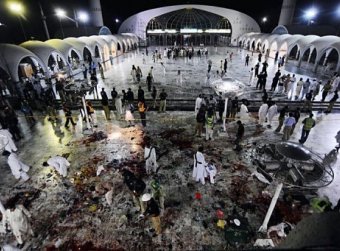Although Sufi shrines have frequently been the targets of terrorist attacks in the entire Pakistan, the Pashtun regions (consisting of Khyber Pakhtunkhwa, the Pakistani tribal areas, and adjacent regions in Afghanistan) have witnessed a significant rise in such attacks in the last five years.At least 56 people were killed in a suicide attack at the gate of Abul Fazil's shrine in Kabul, Afghanistan, on December 7. All the victims were Shia mourners and a majority of them were children.
Sufism has a deep influence on the Pashtun society and a large number of Sufi shrines dot the landscape of Pashtun dominated areas in Afghnaistan and Pakistan. It was the wandering mystics which initially preached Islam in this part of the world.Their footprints dot the country's lush plains and hidden valleys.
Today a foreign funded alien strain of faith is rewriting history:they are attempting to constructing a new culture and a new identity--a one completely divorced from its eclectic sufi past.The attacks began many years ago with Tehreek-e-Taliban Pakistan and Lashkar-e-Islam's targeting of tombs of great Sufi saints in Khyber Pakhtunkhwa and FATA. The shrines of Hazrat Rehman Baba, Abdul Shakoor Malang Baba, Hazrat Abu Saeed Baba, Mian Umer Baba and Malang Baba were attacked and desecrated, while that of Hazrat Sayyad Ali Tirmizi, commonly known as Pir Baba in Buner, was locked. The mausoleum of famous freedom fighter Haji Sahib Tarangzai in Mohmand Agency was captured and converted into Taliban headquarters.
Soon the militants also started targeting shrines in urban Pakistan. These attacks were timed and planned to kill as many devotees as possible. More than 25 shrines across the country have been attacked since 2005, and 200 devotees have been killed. In July 2010, the shrine of Sufi saint Data Ganj Baksh Hajveri in Lahore was attacked by two suicide bombers. At least 45 devotees were killed and dozens others injured. A suicide attack on the shrine of Sufi saint Abdullah Shah Ghazi in Karachi killed another nine people in October 2010. An attack on Baba Farid Shakarganj's shrine in Pakpattan in October that year left another seven people dead.
The March 5, 2009 attack on the mausoleum of Rehman Baba, a revered Pashto Sufi poet of the 17th century, was widely condemned in both Pakistan and Afghanistan.
 |
| Destroyed Sufi Shrine |
Almost all attacks on shrines in Khyber Agency and Peshawar have been claimed by Lashkar-e-Islam, a Khyber agency-based militant group that follows Deobandi and Panjpiri creeds.
The ideological driving force behind this violence is religious extremism, which considers everyone outside its ideological league, Muslim or non Muslim, dead or alive, as an enemy and an infidel deserving to be destroyed. The fanatics blow up ancient relics, Sufi heritage, Sufi shrines and the Sufi way of life everywhere they can. They want to micromanage social, cultural and individual life. They condemn gatherings and ceremonies at Sufi saints’ graves, shaving beards, wearing charms, music and painting as heresy.
 |
| Aftermath of a suicide bomb attack at shrine of Data Sahib Lahore |
The history of Islam is not alien to violence against Sufism. The root of the current upheaval lies in Wahhabism, which has been gradually institutionalized from a tiny band of theologians into a political ideology by the Saudi ruling dynasty. The Wahhabi religious movement was originated by Mohammad Ibn Abdul Wahhab (1703-1792), essentially to challenge the influence of the Ottoman Empire in the Arabian Peninsula. Saudi petrodollars and the Pakistani military ruling elite have helped the spread of this fanatical form of Islam.
The extremists are determined to destroy moderate Sufi tradition — by claiming the exclusive right to fly the banner of Islam and asserting this claim through cultural, educational and violent means.
 |
| A devotee prays at the charred shrine in Srinagar |
The problem along the Afghan border is not mass support for Islamist extremism. Rather it is widespread acquiescence by people who are fearful and demoralized.
As the extremists work to demonstrate that only they represent the true Islam, Pashtuns can reflect on the warnings against cruelty and violence that Rahman Baba outlined in “Sow Flowers”:
Sow flowers to make a garden bloom around you,
The thorns you sow will prick your own feet.
Arrows shot at others
Will return to hit you as they fall.
You yourself will come to teeter on the lip
Of a well dug to undermine another.



No comments:
Post a Comment